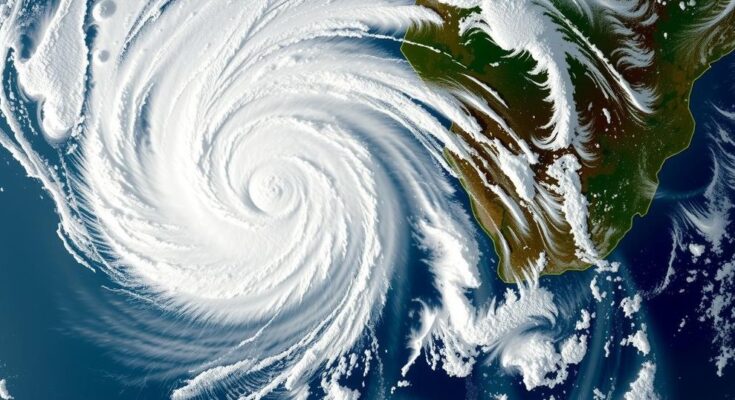Cyclone Chido caused significant damage in Mozambique and Malawi, displacing thousands and leading to fatalities. With winds of up to 160 mph, it destroyed critical infrastructure and highlighted the increasing dangers of climate change in the region. Experts point to rising Indian Ocean temperatures as a contributing factor to the growth of such cyclones. Immediate humanitarian needs and long-term solutions are critical for future resilience.
Cyclone Chido has wreaked havoc in Mozambique and Malawi, causing alarming devastation that has displaced thousands and illuminated the increasing vulnerabilities of southern Africa to climate change. With wind speeds reaching up to 160 miles per hour and significant rainfall, the cyclone has tragically resulted in at least three confirmed fatalities in Mozambique. Furthermore, it has led to the destruction of various infrastructures, including homes and schools.
Current humanitarian needs remain acute, with a significant number of displaced individuals in urgent need of emergency shelters. Access to several affected districts has been severely compromised due to persistent power outages, complicating relief efforts. Experts have drawn direct correlations between the rising temperatures of the Indian Ocean and the frequency and intensity of cyclonic activities, emphasizing that climate change is exacerbating these extreme weather phenomena.
Lucy Mtilatila, the director of Climate Change and Meteorological Services in Malawi, aptly stated, “It’s all because with global warming, the temperatures on the Indian oceans are increasing more than normal. And that is creating a conducive environment for these cyclones to develop.” These reflections underline the critical connection between climate change dynamics and the rising threats faced by vulnerable regions such as southern Africa.
Addressing these implications is paramount. The trend of increasing global temperatures poses an imminent risk of more frequent and severe weather events, adversely affecting the most susceptible populations. Building resilient infrastructure and tackling the underlying causes of climate change are crucial steps to mitigate the potential impacts of future disasters.
Southern Africa, particularly Mozambique and Malawi, is increasingly facing the devastating impacts of climate change, with the occurrence of extreme weather events on the rise. Cyclones, in particular, have become more frequent and intense, largely attributed to the warming of the Indian Ocean. As global temperatures continue to climb, the region’s vulnerabilities are brought into sharper focus, necessitating urgent action to bolster resilience against such natural disasters. Experts emphasize that understanding these patterns is fundamental to developing effective strategies to address the looming threats posed by climate change in this region.
The recent devastation caused by Cyclone Chido underscores the urgent need to address climate vulnerabilities in southern Africa. As extreme weather events become increasingly frequent and severe due to climate change, the region must prioritize building resilient infrastructure and mitigating fundamental climate issues. This approach will be essential for protecting susceptible communities and reducing the impact of future natural disasters in the wake of ongoing global warming.
Original Source: www.dailyclimate.org




